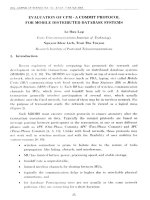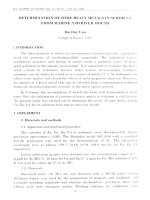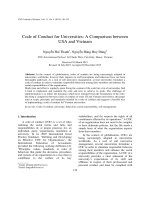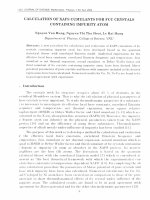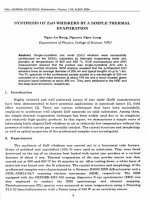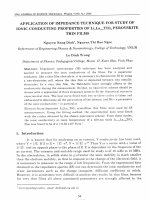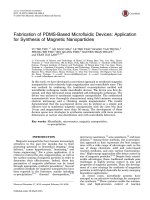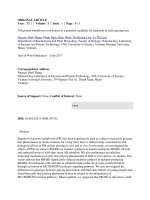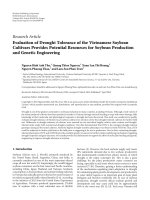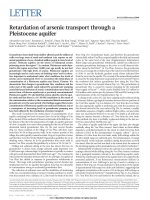DSpace at VNU: Code of Conduct for Universities: A Comparison between USA and Vietnam
Bạn đang xem bản rút gọn của tài liệu. Xem và tải ngay bản đầy đủ của tài liệu tại đây (126.04 KB, 13 trang )
VNU Journal of Science, Vol. 31, No. 4 (2015) 110-122
Code of Conduct for Universities: A Comparison between
USA and Vietnam
Nguyễn Hải Thanh1, Nguyễn Đặng Huy Đăng2
VNU International School, 144 Xuân Thủy, Cầu Giấy, Hanoi, Vietnam
Received 10 March 2015
Revised 18 July 2015; Accepted 20 December 2015
Abstract: In the context of globalisation, codes of conduct are being increasingly adopted in
universities worldwide; however their impacts on staff perceptions and behaviour have not been
thoroughly addressed. As a tool of soft innovative management, several universities formulate a
code of conduct in order to stimulate responsible behaviour among their members and enhance the
social responsibilities of the organization.
Much time and effort is regularly spent fixing the content of the code but a lot of universities find
it hard to implement and maintain the code and how to achieve its goals. The challenge of
implementation is to utilize the dynamics which have emerged from the formulation of the code.
By doing a comparison between codes of conduct of some US and Vietnam universities, this paper
aims at scope, principles and standards included in a code of conduct and suggests a feasible way
of implementing a code of conduct for Vietnam universities.
Keywords: Code of conduct, university, behaviour, social responsibility, soft management.
1. Introduction12
stakeholders, and (b) respects the rights of all
constituents affected by its operations." A COC
of an organization does not need to be complex
or have elaborate policies, but the file needs a
simple basis of what the organization expects
from their members.
In the context of globalisation, COCs are
being increasingly adopted in universities
worldwide. As a tool of soft innovative
management, several universities formulate a
COC in order to stimulate responsible behavior
among their members and enhance the social
responsibilities of the organization. A COC of a
university provides a clear statement of the
university’s expectations of its staff and
affiliates in respect of their professional and
personal conduct and must be complied with
A code of conduct (COC) is a set of rules
outlining the social norms and rules and
responsibilities of, or proper practices for, an
individual, party, organization, institution or
university. In its 2007 International Good
Practice Guidance, "Defining and Developing
an Effective COC for Organizations", the
International Federation of Accountants
provided the following working definition [4]:
"Principles, values, standards, or rules of
behaviour that guide the decisions, procedures
and systems of an organization in a way that (a)
contributes to the welfare of its key
_______
1
2
Email:
Email:
110
N.H. Thanh, N.Đ.D. Đăng/ VNU Journal of Science, Vol. 31, No. 4 (2015) 110-122
the relevant policies, standards, laws and
regulations that guide the university’s activities.
It is a shared statement of commitment of all
members of the university community to
upholding and advancing the ethical,
professional and legal standards [5], such as:
freedom to pursue critical and open inquiry in a
responsible manner; recognition of the
importance of ideas and ideals; tolerance,
honesty, respect, and ethical behavior; and
understanding the needs of those the university
serves. These values and standards are the basis
for the university’s daily, short-term and longterm decisions and actions [6].
In this paper, first, concepts and principles
of COCs, for organizations in general, and for
universities in particular, are reviewed. Then, a
comparison study on COCs for universities in
USA and in Vietnam is made in order to
determine main sections and articles of a typical
COC for Vietnam universities and its effective
implementation. Next, results of a survey
analysis of these sections and articles are
reported. Finally, a possible proposal on design
and implementation of a COC for Vietnam
universities is discussed.
2. COC’S for organizations and universities:
concepts, scopes, principles, standards and
implementation
2.1. Concepts
The process of globalisation has come with
fundamental challenges for the effective and
legitimate governance of transboundary affairs.
On the one hand, the transnational nature of
many contemporary policy issues exceeds the
regulatory capacities of territorially defined
national regulation; on the other, the traditional
mode of ordering global affairs through classic
international ‘hard law’ faces the inherent
limitations of achieving the necessary political
consensus [7]. It should be noticed, in the
context of globalisation, organizations in
general and universities in particular need to be
111
operated with regulations based on / conformed
to international standards.
COCs for organizations as well as for
universities do not have any authorized
definition. At a very basic level, they all aim to
define standards and principles that ought to
guide the behavior of the addressee in a
particular way. As such, COCs are regulatory
instruments and fall into the broad normative
realm of soft law, namely, of soft innovative
management. They are not of recent vintage,
yet it was not until the second half of the
twentieth century, i.e. in the context of
globalisation, that they rose to prominence as
regulatory responses to the challenges posed by
the globalisation of the world economy and
university education development. COCs for
organizations and universities can be broadly
defined as commitments voluntarily made by
the organization or the university, which put
forth standards and principles for the conduct of
their activities in the marketplace. They purport
to shape organization conduct in a certain way –
through a catalogue of principles that define a
set of relationships between the organization
and its stakeholders / members on a range of
topics [7].
A COC of a university may be formulated
to provide a clear statement of the university’s
expectations of its staff and affiliates in respect
of their professional and personal conduct. The
Code reflects, and is intended both to advance
the object of the University, namely the
promotion of scholarship, research, free inquiry,
the interaction of research and teaching, and
academic excellence, as well as to secure the
observance of its values of: responsibility and
service through leadership in the community;
quality and sustainability in meeting the needs
of the university’s stakeholders; merit, equity
and diversity in the university’s student body;
integrity, professionalism and collegiality in the
university’s staff; and lifelong relationship and
friendship with the university’s alumni [6].
In [1], a COC is a set of rules about how to
behave and do business with other people
(according the Cambridge dictionary) or, in
112
N.H. Thanh, N.Đ.D. Đăng / VNU Journal of Science, Vol. 31, No. 4 (2015) 110-122
some other meaning, a set of standards that
members of a particular profession agree to
follow in their work (according the Oxford
dictionary). And hence, a COC has, firstly, a
scope to define individual’s expected standards
and conduct in relationship with other
individuals, with the organization and its offices
and departments; secondly, these expected
standards are imposed on all individuals and
offices and departments of the organization;
thirdly, the COC can be considered as a soft
management tool for managers to operate
effectively all activities of the organizations and
to achieve the objectives that have been set.
The COC of the Stanford University
community includes the following topics [5]:
Standards
of
integrity
and
quality,
confidentiality and privacy, conflict of interest /
commitment, human resources, financial
reporting, compliance with laws, use of
university resources, reporting suspected
violation. Meanwhile, in the COC of the
University of Sydney the topics include [6]:
Personal and professional behavior, conflicts of
interest, intellectual property, secondary
employment and outside earnings, acceptance
of gifts and benefits, public comment, use and
security of official information, use of
university
resources,
notification
of
wrongdoing, equity of access and prevention of
harassment and discrimination, work health &
safety. It can be observed that several topics of
these COCs have the same name and other
topics describe the same content. COCs are
lists of statements of the ethical and legal
standards which are applied as the basis for
decisions and actions [8] and are dedicated to
advancing the university’s core values [10].
2.2. Scope and principles
In general, COCs of universities have the
following sections: Scope, guiding principles,
standards of conduct and related policies on
how to ensure and maintain the standards [10].
A COC of a university is a shared statement
of commitment to upholding the ethical,
professional and legal standards that is used as
the basis for the university’s daily, short-term
and long-term decisions and actions. All the
members of the university community must be
cognizant of and comply with the relevant
policies, standards, laws and regulations that
guide their work. They are each individually
accountable for our own actions and, as
members of the university community, are
collectively accountable for upholding these
standards of behavior and for compliance with
all applicable laws and policies [5]. Therefore,
the following scope and guiding principles are
common to COCs of universities: Integrity and
Compliance.
For illustration, the general principles of the
Washington University’s COC may be
considered [8]:
“Statement of General Principles: This
code applies to the following members of the
Washington University community: (a)
individuals who are paid by Washington
University when they are working for the
University—this category includes faculty and
staff; (b) consultants, vendors, and contractors
when they are doing business with the
University; and (c) individuals who perform
services for the University as volunteers. The
COC refers to all these persons collectively as
members of the University community or
community members.
Integrity and Ethical Conduct: Washington
University is committed to the highest ethical
and professional standards of conduct as an
integral part of its mission, the promotion of
learning. To achieve this goal, the University
relies on each community member's ethical
behavior, honesty, integrity, and good
judgment. Each community member should
demonstrate respect for the rights of others.
Each community member is accountable for
his/her actions. This COC describes standards
to guide us in our daily University activities,
standards we believe are already being
followed.
Compliance with Laws and University
Policies: The University and each community
N.H. Thanh, N.Đ.D. Đăng/ VNU Journal of Science, Vol. 31, No. 4 (2015) 110-122
member must transact University business in
compliance with all laws, regulations, and
University policies supervisors are responsible
for teaching and monitoring compliance in their
areas, elated to their positions and areas of
responsibility. Managers and supervisors are
responsible for teaching and monitoring
compliance in their areas.”
Another illustration example may be the
guiding principles of the University of
Minnesota [10]:
“Scope
The COC applies to the following members
of the University of Minnesota community: i)
members of the Board of Regents; ii) faculty
and staff; iii) any individual employed by the
university, using university resources or
facilities, or receiving funds administered by
the university; and iv) volunteers and other
representatives when speaking or acting on
behalf of the university. The COC is intended to
reflect other Board and University policies and
procedures and does not create any additional
or different rights or duties of a substantive or
procedural nature.
Guiding principles
Values: In carrying out the institution’s
research, teaching, and public service mission,
members of the University community
(community members) are dedicated to
advancing the University’s core values. These
values embrace commitment to: excellence and
innovation; discovery and the search for truth;
diversity of community and ideas; integrity;
academic
freedom;
stewardship
and
accountability for resources and relationships;
sharing knowledge in a learning environment;
application of knowledge and discovery to
advance the quality of life and economy of the
region and the world; and service as a land
grant institution to Minnesota, the nation, and
the world.
Standards of Conduct: Community
members must be committed to the highest
ethical standards of conduct and integrity. The
standards of conduct in this COC, supported
113
through policies, procedures, and workplace
rules, provide guidance for making decisions
and memorialize the institution's commitment
to responsible behavior.”
The main principles of COC’s: Integrity and
compliance are applied not only for universities
but
also
for
organizations,
business
corporations in general. As an illustrative case,
the letter from Mr. Louis C. Camilleri,
Chairman and CEO to the employees of Philip
Morris International (PMI) printed on the first
page of the PMI COC brochure mentioned [9]:
“There is a simple idea that stands behind
everything we do: We pursue our business
objectives with integrity and in full compliance
with all laws. This is the right thing to do and it
makes good business sense. By acting with
integrity we earn the trust of our customers,
consumers,
shareholders,
co-workers,
regulators, suppliers and the communities
where we live and work — those whose trust
we must have to be successful… This PMI
COC is a key resource in our commitment to
integrity. The Code explains many of the basic
rules that apply to our businesses and the
personal responsibility each of us has to speak
up if we have a good faith basis to believe that
something doesn't seem right.
Read the Code carefully. This will help you
make sure that your actions never fall short of
PMI's commitment to do the right thing.
Nothing is more important than our
commitment to compliance and integrity — no
financial objective, no marketing target, and no
effort to outdo the competition. No desire to
please the boss outweighs that core
commitment. Our commitment to compliance
and integrity must always come first. This Code
is about who we are and who we choose to be.
It is about how we do business — everywhere
and all the time. Together, by following the
letter and spirit of this Code, we can help
ensure that working for Philip Morris
International is a source of great pride.”
2.3. Implementation of COCs
114
N.H. Thanh, N.Đ.D. Đăng / VNU Journal of Science, Vol. 31, No. 4 (2015) 110-122
Implementation or operation of a COC may
include the following contents [3], [11]: i)
Promotion of best practices; ii) Review of
proposals for creating or amending the COC;
iii) Providing advice and information on the
implementation of the COC; iv) Providing
education on the COC; v) Producing and
distributing training materials on the COC; vi)
Seminar for officials in charge of the COC; vii)
Investigation and monitoring of the COC. The
most fundamental are two contents: Providing
advice and information on the implementation
of the COC and Investigation and monitoring of
the COC.
For effective implementation / operation of
a COC, as a typical example, one may consider
the case of the Washington University and
following measures [8]: i) COC; ii) Annual
Certification Instructions; iii) Statement of
General Principles; iii) Procedures for
Reporting Violations or Concerns; iv)
Questions and Answers; iv) Online Reporting
Form. It can be observed, that Annual
Certification Instructions, Questions and
Answers are relevant to Providing advice and
information on the implementation of the COC.
Meanwhile,
Procedures
for
Reporting
Violations or Concerns, Oline Reporting Form
are relevant to Investigation and monitoring of
the COC.
Providing advice and information on the
implementation of the code of conduct
In the Washington University, concerning
conduct standards in protecting and preserving
university resources, the members of the
university community can read the following
administrative policies: Finance/Accounting
and Financial Oversight Guiding Principles;
Outside Consulting and Other Commitments;
Acceptable Use of Information Technology
Resources; Traveling On University Business;
Use of University Equipment and Services [8].
The Office of Compliance of the Washington
states the policy of implementing the university
COC in the Letter from the Chancellor
Washington University Professor Mark S.
Wrighton to the university Community as
follows:
“As members of the Washington University
community, we are all responsible for
maintaining the highest ethical standards in our
community and our professions, and for
complying with all relevant laws and
regulations.
In April 2000, the university, with the
encouragement and guidance of the Board of
Trustees, established a University Compliance
Office. As part of this effort, a Washington
University COC has been created. The COC is
not a list of rules. It is a statement of the ethical
and legal standards we use as the basis for our
decisions and actions. All members of the
university community should integrate these
standards into their daily university activities.
The code of conduct consists of this
message, a Statement of General Principles,
Procedures for Reporting Violations or
Concerns and Questions and Answers. The
COC may be revised from time to time. An upto-date version of the code will always be
available on this website.
If you have any questions about the COC,
please contact the University Compliance
Office at 314-362-4909 or university
Compliance Office at 314-362-4909 or
“
To clarify the meaning of sentence “COC is
not list of rules” mentioned in the above letter,
it should be emphasized that a COC is not list
of “hard rules” to comply with but “soft rules”
to promote expected standards of each member
of the university community.
Questions and Answers
The Washington University COC includes
Questions and Answers section with the
following content [8]:
What are the various areas of university
activity governed by federal laws and
regulations?
Who is subject to the COC?
N.H. Thanh, N.Đ.D. Đăng/ VNU Journal of Science, Vol. 31, No. 4 (2015) 110-122
The university has been in existence for
over 150 years. Why do we need a COC now?
How will my daily work be affected by the
COC?
How will you know whether all members of
the university community have received a copy
of the COC?
If I am involved in purchasing decisions,
may I accept gifts or favors from vendors even
if I am confident that these gifts or favors have
no influence on my purchasing decisions or
recommendations?
Research faculty members complete
conflict of interest disclosures annually. What is
the requirement for other faculty and staff
employees?
Will I get into trouble if I report what I
believe is a potential violation of the COC and
then the incident is judged not to be a violation?
Will I be penalized if I witness a violation
of the COC and I report it even though my
supervisor tells me not to report it?
I do not want my supervisor to know that
I'm reporting a potential COC violation. Can I
do so anonymously?
If I believe a violation has occurred but I
don't report it, what could happen to me?
Who will investigate reported potential
violations?
Who
determines
the
appropriate
disciplinary action for violations?
How much will I have to be involved in the
investigations if I report a potential violation?
Will I be informed of the resolution of
potential violations that I report?
(Answers are given appropriately)”.
Investigation and monitoring of the code of
conduct
In the Washington University, investigation
and monitoring of the COC is conducted
through the prescribed procedures as follows
[8]:
“Procedures for Reporting Violations or
Concerns: The University’s compliance effort
115
focuses mainly on teaching members of the
university
community
the
appropriate
compliance standards for the areas in which
they work. Nevertheless, violations may occur.
In addition, members of the university
community may have concerns about matters
that they are not sure represent violations. This
section describes community members’
responsibilities for reporting violations or
concerns, and how these responsibilities may be
carried out. Each community member is
expected to report violations or concerns about
violations of this COC that come to his/her
attention. Managers have a special duty to
adhere to the standards set forth in this COC, to
recognize violations and to enforce the
standards. Disciplinary actions for proven
violations of this Code, or for retaliation against
anyone who reports possible violations, will be
determined on a case-by-case basis and may
include termination of employment. Individuals
who violate the code may also be subject to
civil and criminal charges in some
circumstances.
How to Report a Violation or Discuss a
Concern: You may report violations or
concerns to your immediate supervisor or
department head, if appropriate. You may also
call the University Compliance Hotline at the
number established for this purpose: 314-3624998. Reports may be made anonymously to
this number, if the caller so desires. This
telephone line has no caller identification or
number recognition. The Online Reporting
Form can also be used to report violations or
concerns.
For matters dealing with one of the specific
areas below, you may call the number
indicated, or you may call the University
Compliance Office at 314-362-4909.
Animal Care Issues: Jennifer Lodge, Vice
Chancellor for Research, 314-747-0515.
Computer Use & Security Policies: John
Gohsman, Vice Chancellor and Chief
Information Officer 314-935-7391.
116
N.H. Thanh, N.Đ.D. Đăng / VNU Journal of Science, Vol. 31, No. 4 (2015) 110-122
Kevin Hardcastle, Chief Information
Security Officer, 314-935-7986.
Michael
Caputo,
Asst.
Dean-Chief
Information Officer, Medical Computing
Services, 314-747-4343.
Conflict of Interest Issues – Research:
Jennifer Lodge, Vice Chancellor for Research,
314-747-0515.
Conflict of Interest – Clinical and
Physician, Relationship with Drug and Medical
Equipment or Device Companies: Dr. James
Crane, Assoc. Vice Chancellor for Clinical
Affairs, 314-362-6249
Conflict of Interest – Procurement: Alan
Kuebler, Asst. Vice Chancellor for Resource
Mgt. ,314-935-5727.
Environmental Health and Safety: Bruce
Backus,
Asst.
Vice
Chancellor
for
Environmental Health & Safety, 314-362-6816.
Export Control: Jennifer Lodge, Vice
Chancellor for Research. (314) 747-0515.
Finance: Barbara Feiner, Vice Chancellor
for Finance & CFO, 314-935-9018.
HIPAA (Health Insurance Portability and
Accountability Act), HIPAA Privacy Issues:
Sondra Hornsey, Privacy Officer, 314-747-4975.
HIPAA Security Issues: Kevin Hardcastle,
Chief Information Security Officer, 314-9357986.
Human Studies: Jennifer Lodge, Vice
Chancellor for Research, 314-747-0515.
Human Resources/Personnel Issues, All
Campuses: Legail Chandler, Vice Chancellor
for Human Resources, 314-935-4900; Apryle
Cotton, Assistant Vice Chancellor for Human
Resources, 314-935-8095….
Research Financial Management: Jennifer
Lodge, Vice Chancellor for Research, 314-7470515.
Research Integrity: Jennifer Lodge, Vice
Chancellor for Research, 314-747-0515.”
3. Comparison of COC for US and Vietnam
universities
A comparison of COC for US and Vietnam
Universities may indicate several similarities
and differences and serve as a frame to build a
feasible COC for a Vietnam university in the
era of globalization when some top universities
of Vietnam need to be operated with regulations
based on / conformed to international standards.
It can be said that, each organization has
specific shared values. They are operative
beliefs that people of any description can apply
in their labor toward a common vision. This
common vision can be codified into a
functional COC.
According to Bean, D and Bernardi, R [2]
“The need for written "codes of conduct" for
businesses is evident in the current literature.
However, there is not sufficient evidence
regarding the implication of codes of conduct in
a college. Academic dishonesty has become an
important issue in institutions of higher
education. Codes of conduct can also provide a
basis for ethical behavior in colleges and
universities”. By looking at some COCs for US
universities, it can be found that these
universities define sets of core, shared, ethical
values. Sometimes these values sets become
codes of conduct. Not surprisingly, the
important values chosen by institutions tend to
look rather similar in terms of five dominantly
typical values: Honesty, Responsibility,
Respect, Fairness and Compassion.
However, creating a code by seeking and
listing the values is not enough. The sincere
organization will request employees at all levels
to decide how to apply those values in their
everyday activities. They will look at how the
values will affect planning and the process of
determining organizational strategy. The values
will also function as analytical tools in making
mission decisions and in setting policy for
personnel.
COCs for US Universities clearly state
about the standards for all stakeholders
including board of regents, faculties, staff and
students and these standards are defined based
on the core values of a university. However, for
some Vietnam universities the major provisions
of the COC essentially apply for staff,
N.H. Thanh, N.Đ.D. Đăng/ VNU Journal of Science, Vol. 31, No. 4 (2015) 110-122
employees, only a few announce Student COC
but rather simple and incomplete. For example,
the COCs of Hanoi Open University and the
University of Agriculture and Forestry, Thai
Nguyen University define clearly about what
the officials and employees are doing and not
be expressed in explicit terms as qualities,
ethics and lifestyle; the COCs of Nha Trang
University and Tan Tao University contain
standards for both employees and students. By
Similarities
Differences
analyzing the COC of Stanford University,
Washington... one can find that the standards of
conduct are behavior oriented for stakeholders
based on the core values of a university such as
integrity
and
quality;
privacy
and
confidentiality; dispute resolution, human
resources,
financial
statements,
legal
compliance, using the resources and individual
report obligation when violations detected.
US Universities
Compliance with laws and university
policies and regulations
Ethics
Integrity
Honesty
Applicable to various stakeholders:
leadership, staff, faculty, employee,
student
Behavior and attitude -oriented terms
Confidentiality and Privacy
Conflict of Interest/ Conflict of
Commitment
Human Resources
Report Obligation
Anti-bribery
Strong measures for implementation and
operation of COC
4. Main sections and articles of COC to be
implemented in Vietnam
Based on the above comparison between
some COCs for US and Vietnam universities
and also on the review of concepts, scopes,
principles, standards and implementation of
COC that has been made in this paper, a COC
applicable to an educational institution in
Vietnam in the context of globalization may be
proposed as follows:
SECTION I. SCOPE.
The COC (Code) applies to the following
members of the University community:
• leadership;
• faculty and staff;
• students;
117
Vietnam Universities
Compliance with laws and university
policies and regulations
Ethics
Integrity
Honesty
Mainly applicable to staff and employee
Do’s and Don’ts, oriented terms
Centralized
Lifestyle
Criticism
Not enough measures for implementation
and operation of COC measures
• any individual employed by the
University, using University resources or
facilities, or receiving funds administered by
the University;
• volunteers and other representatives when
speaking or acting on behalf of the University.
SECTION II. GUIDING PRINCIPLES.
Subd.1.
Values.
In carrying out the institution's
research, teaching, and public service mission,
members of the University community
(community members) are dedicated to
advancing the University's core values. These
values embrace commitment to:
• excellence and innovation;
• discovery and the search for the truth;
• diversity of community and ideas;
118
N.H. Thanh, N.Đ.D. Đăng / VNU Journal of Science, Vol. 31, No. 4 (2015) 110-122
• integrity;
• academic freedom;
• stewardship and accountability for
resources and relationships;
• sharing knowledge in a learning
environment;
Subd.2.
Commitment
to
Ethical
Conduct.
Community members must be committed to the
highest ethical standards of conduct and
integrity. The standards of conduct in this Code,
supported through policies, procedures, and
workplace rules, provide guidance for making
decisions and memorialize the institution's
commitment to responsible behavior.
SECTION
III.
STANDARDS
OF
CONDUCT.
The University holds itself and community
members to the following standards of conduct:
Subd.1.
Act Ethically and with Integrity. Ethical
conduct is a fundamental expectation for every
community member. In practicing and
modeling ethical conduct, community members
are expected to:
• act according to the highest ethical and
professional standards of conduct;
• be personally accountable for individual
actions;
• fulfill obligations owed to students,
advisees, and colleagues;
•
conscientiously meet University
responsibilities; and
• communicate ethical standards of conduct
through instruction and example.
Subd.2.
Be Fair and Respectful to Others. The
University is committed to tolerance, diversity,
and respect for differences. When dealing with
others, community members are expected to:
• be respectful, fair, and civil;
• speak candidly and truthfully;
• avoid
all forms of harassment, illegal
discrimination, threats, or violence;
•
provide equal Access to programs,
facilities, and employment; and
• promote conflict resolution.
Subd.3.
Manage Responsibly. The University
entrusts community members who supervise or
instruct employees or students with significant
responsibility.
Managers,
supervisors,
instructors, and advisors are expected to:
• ensure access to and delivery of proper
training and guidance on applicable workplace
and
educational rules,
• policies, and procedures, including this
Code;
• ensure compliance with applicable laws,
policies, and workplace rules;
• review performance conscientiously and
impartially;
• foster
intellectual
growth
and
professional development; and
• promote a healthy, innovative, and
productive atmosphere that encourages dialogue
and is responsive to concerns.
Subd.4.
Protect
and
Preserve
University
Resources. The University is dedicated to
responsible stewardship. Community members
are expected to:
• use University property, equipment,
finances, materials, electronic and other
systems, and other resources only
for
legitimate University purposes;
• prevent waste and abuse;
• promote efficient operations;
• follow sound financial practices, including
accurate financial reporting, processes to
protect assets, and responsible fiscal
management and internal controls; and
• engage in appropriate accounting and
monitoring.
Subd.5.
N.H. Thanh, N.Đ.D. Đăng/ VNU Journal of Science, Vol. 31, No. 4 (2015) 110-122
Promote a Culture of Compliance. The
University is committed to meeting legal
requirements and to fostering a culture of ethics
and compliance.
(a) Expectations – Community members are
expected to:
• learn and follow the laws, regulations,
contracts, and University policies and
procedures
applicable
to
University
activities;
• be proactive to prevent and detect any
compliance violations;
• report suspected violations to supervisors
or other University officials; and
• ensure that reports of violations within
their area of responsibility are properly
resolved.
(b) Prohibition – Community members are
prohibited from retaliating against another
community member for reporting a suspected
compliance violation.
Subd.6.
Preserve Academic Freedom and Meet
Academic Responsibilities. Academic freedom
is essential to achieving the University's
mission. Community members are expected to:
• promote academic freedom, including the
freedom to discuss all relevant matters in the
classroom, to explore all avenues of
scholarship, research, and creative expression,
and to speak or write as a public citizen without
institutional restraint or discipline; and
• meet
academic
responsibilities,
which means to seek and state the truth; to
develop and maintain scholarly competence; to
foster and defend intellectual honesty and
freedom of inquiry and instruction; to respect
those with differing views; to submit
knowledge and claims to peer review; to work
together to foster education of students; and to
acknowledge when an individual is not
speaking for the institution.
Subd.7.
Ethically Conduct Teaching and Research.
University researchers have an ethical
obligation to the University and to the larger
119
global community as they seek knowledge and
understanding.
Community members are expected to:
• propose, conduct, and report research
with integrity and honesty;
•
protect people and humanely treat
animals involved in research or teaching;
• learn,
follow,
and
demonstrate
accountability for meeting the requirements of
sponsors, regulatory bodies, and other
applicable entities;
• faithfully transmit research findings;
• protect rights to individual and University
intellectual property;
• ensure originality of work, provide credit
for the ideas of others upon which their work is
built, and be responsible for the accuracy and
fairness of information published; and
• fairly assign authorship credit on the basis
of an appropriate array of significant
intellectual
contributions,
including:
conception, design, and performance; analysis
and interpretation; and manuscript preparation
and critical editing for intellectual content.
Subd.8.
Avoid
Conflicts
of
Interest
and
Commitment. Community members have an
obligation to be Objective and impartial in
making decisions on behalf of the University.
To ensure this objectivity, Community
members are expected to:
• avoid
actual
individual
or
institutional conflicts of interest;
• disclose potential conflicts of interest and
adhere to any management plans created to
eliminate any conflicts of interest; and
• ensure personal relationships do not
interfere with objective judgment in decisions
affecting University employment or the
academic progress of a community member.
Subd.9.
Carefully Manage Public, Private, and
Confidential Information. Community members
are the creators and custodians of many types of
120
N.H. Thanh, N.Đ.D. Đăng / VNU Journal of Science, Vol. 31, No. 4 (2015) 110-122
information. The public right to access and the
individual's right to privacy are both governed
by laws and University policies. To meet these
responsibilities, community members are
expected to:
• learn and follow laws and University
policies and agreements regarding access, use,
protection, disclosure, retention, and disposal of
public, private, and confidential information;
• follow document preservation and
retention guidelines; and
• maintain data security using electronic
and physical safeguards.
Subd.10.
Promote Health and Safety in the
Workplace. Community members have shared
responsibility to ensure a safe, secure, and
healthy environment for all University students,
faculty, staff, volunteers, and visitors.
Community members are expected to:
COC Area
a) People and Community
b) Honesty and Integrity
c) Protection and Care
d) Duty and Responsibility
• follow safe workplace practices, including
participating in applicable education sessions,
using appropriate personal safety equipment,
and reporting accidents, injuries, and unsafe
situations;
• maintain security, including securing
University assets and facilities;
• report suspicious activities; and
• protect the environment, including
carefully handling hazardous waste and other
potentially harmful agents, materials, or
conditions.
5. Observation case
An observation has been carried out using a
questionnaire for a sample of 30 interviewees
including faculties, students and staff inside and
outside VNU-IS. Questions are designed based
on divided areas and appropriate principles as
follows:
COC Principles
1) Respect for Others
2) Individual Responsibility and Accountability
3) A Service Ethos
4) Protection and Promotion of Fundamental Rights
5) Responsible Conduct of Academic Activities
6) Academic Freedom
7) Avoidance of Conflicts of Interest
8) Responsible Use of Resources
9) Well-being, Health and Safety
10) Sustainability and the Appropriate Use of Resources
11) Information Privacy, Confidentiality and Security
12) Compliance with Law, Regulations and University Policies
13) Obligation to Report
6. Preliminary conclusions
In this paper, an attempt has been made to
explore scope, principles and standards of
COCs, to compare COCs of US and Vietnam
universities with the aim to build a COC
applicable for a Vietnam university.
The paper is only a snap-shot of the COC,
the findings obviously are preliminary and not
without limitations, and as a result of this it
cannot provide comprehensive insights into
similarities and differences of COCs for US and
Vietnam universities. Therefore, it is suggested
that future investigation about COC can be
carried out with a larger sample, thus testing the
N.H. Thanh, N.Đ.D. Đăng/ VNU Journal of Science, Vol. 31, No. 4 (2015) 110-122
extent to which the findings can be generalized
effectively. It also would then be reasonable to
study over a period of time in different Vietnam
universities, thereby giving more clear insights
into the dynamic of the concept of COC for
Vietnam universities (state-owned as well as
private ones).
References
[1] Mai Anh, “COC: concepts and how to create it?”
(In Vietnamese), Proceedings of The Conference
“Creating and Implementing COCs for Hanoi
people”, Hanoi, Vietnam (2012), pp. 58-67.
[2] David F. Bean, Richard A. Bernardi, “Ethical
Behaviour in Higher Educational Institutions: The
Role of the Code of Conduct”, Journal of
Academic Ethics, Volume 5, Issue 1 (2007), pp.
59-75.
[3] Nguyen Hai Thanh, Pham Nhat Minh, “COC:
Concepts and Implementation” (in Vietnamese),
Proceedings of The Conference “Creating and
Implementing COCs for Hanoi people”, Hanoi,
Vietnam (2012), pp. 96-100.
121
[4] , accessed 02 Sep 2015.
[5] accessed 02 Sep
2015.
[6] />m=PDOC2011/65&RendNum=0, accessed 02 Sep
2015.
[7] />r.pdf, accessed 02 Sep 2015.
[8] />uct/Pages/default.aspx, accessed 10 Sep 2015.
[9] />s_cr_shareholder_information/documents/2014/p
mi%20code %20of%20conduct.pdf, accessed 10
Sep 2015.
[10] />policies/Code_of_Conduct.pdf, accessed 10 Sep
2015.
[11] />C/WorkingGroups/workinggroup4/2012-August27/Responses_NVs_2012/20120507_Korea_English
_4.pdf, accessed 10 Sep 2015.
122
N.H. Thanh, N.Đ.D. Đăng / VNU Journal of Science, Vol. 31, No. 4 (2015) 110-122
Appendix. Questionnaire
1. Please indicate the extent of agreement that you agree or disagree.
Entirely
agree
11
As part of a community dedicated to creating, supporting the creation of and
communicating knowledge, the people who work and learn at the University
rely on each other. The way that individuals conduct themselves in relation to
others is the cornerstone of ethical conduct in the University.
22
Honesty and Integrity are fundamental in a community committed to the
pursuit of knowledge and performing to the highest professional standards.
Staffs are expected to conduct their work in an open, honest, responsible
manner and in compliance with all applicable laws and regulations.
33
The protection of the University community and the environment that sustains
activities and well-being is a key priority for the University.
44
Ethical conduct is one of a core value of the University and part of its culture.
The University will ensure that legal requirements are embedded within
policies and practices and that this information is readily available to staff,
students and individuals acting on behalf of the University or in the name of
the University including those who hold an honorary status with the University
or former employees who have been conferred privileges at the University.
Entirely disagree
1
2
3
4
5
1
2
3
4
5
1
2
3
4
5
1
2
3
4
5
2. Please tick standard(s) that you consider most important in a Code of Conduct
1. Respect for others
2. Individual Responsibility and Accountability
3. A service ethos
4. Protection and promotion of fundamental rights
5. Responsible conduct of academic activities
6. Academic freedom
7. Avoidance of Conflicts of Interest
8. Responsible use of resources
9. Well-being, Health and Safety
10. Sustainability and the Appropriate Use of Resources
11. Information Privacy, Confidentiality and Security
12. Compliance with Applicable Laws, Regulations and University Policies
13. Obligation to report
